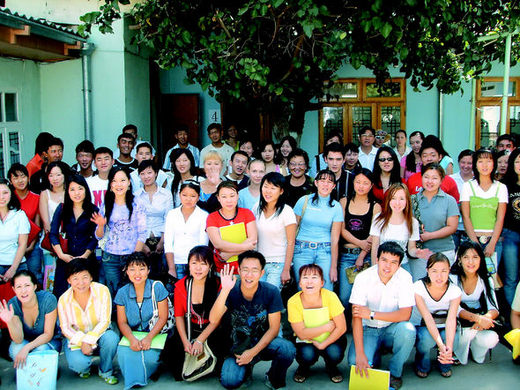 |
|
Young ethnic Koreans and Uzbeks gather to learn Korean at Sejong School in Tashkent
|
Away from Soviet rule, region undergoes global shift
"I like to sing. My parents scold me daily for wearing gaudy clothes. But, well, I am a singer." These are the words of 17-year-old Park Natasha, whom I met in Tashkent. She is a fifth-generation Korean living in the capital of Uzbekistan. Nearly 70 years ago, her great-grandfather was forced to take a month-long train journey to this Central Asian land. Any grudge he might have borne against his new home, far from Korea, cannot be found in his great-granddaughter. In Tashkent, learning the Korean language has become quite popular, but Park, who cannot speak Korean, is not interested. Instead, she introduced herself in fluent English. "I have been taking English conversation lessons for five years. It costs money, but it is very interesting."Park, who likes U.S. singer Christina Aguilera, holds the hope of one day singing onstage in a Western country. In contrast to Park’s story, the desire to learn the Korean language has swept over many young Koreans in Uzbekistan over the past two or three years. They used to be busy learning Russian or Uzbek, but now they are getting in touch with their ethnic roots, buried long ago under the Soviet system. Park Irina, 25, is the only Korean announcer at Uzbekistan’s state-run broadcasting company, where she has worked since 2001. Though her salary is small, she said she became an announcer "for pleasure, not for money." The fourth- or fifth-generation Koreans living in Central Asia are transforming Korean society there. Between them and first- to third-generation Koreans, there exists a clear social and cultural boundary. Unlike the earlier emigrants, who had to adapt to Soviet society, these fourth- or fifth-generation Koreans have grown up in a nation independent from Russia. Under such a social and historical background, they are in a sense forging a new generation of ethnic Korean identity. Kim Victoria, 45, an official at the Department of Korean Language Studies at Tashkent State Eastern Institute, said, "Unlike previous Koreans, who succeeded through diligence and sincerity in a socialist society without much personal choice, younger Koreans have learned the meaning of freedom and competition." In the past, the wish of ethnic Koreans here was to become public servants or doctors, but now they have a preference for occupations such as business, entertainment, or IT. In addition, while first, second, or third-generation Koreans were able to adapt successfully to Soviet society, due to Uzbek nationalism emerging during the Central Asian independence movement, many ethnic Koreans from younger generations have had to suffer a great deal of hardship. These "young Koreans," however, have created, in a sense, a ’new history’ of ethnic Korean society in Uzbekistan, one different from the history of their ancestors, who were forced to surmount a difficult situation. Diligence and a desire for learning are attributed to the success of ethnic Koreans in Uzbekistan; they make up less than 1 percent of the population of Uzbekistan, but 10 to 15 percent of the business community. "In the past, those who spoke the Russian language could get a job, but now many try to learn Uzbek, English, and Korean at the same time," said Gogai Andrei, 39, an ethnic Korean and head of the Korean Cultural Association. To seek better salaries, he said, "more and more talented young people want to have their own business. These youngsters’ success will lead to the development of Uzbekistan," he added. Many Central Asian nations have opened their doors to the greater world, and Koreans of the younger generations have used this opportunity as a gateway to something more. Eight out of Park Irina’s 10 friends went abroad to study or to get a job. "Are they rich? In many cases, they borrow money to go abroad and repay the money through working hard. I held a job as a clerk in a clothing store while I studied in Korea," Park said. Whether looking to the West for opportunity or reclaiming the Korean language in some cases lost to them, ethnic Koreans in Central Asia are part of a world that is seeing permanent change, one in which culture, ethnicity, and nationality are in flux. On September 1, when Uzbekistan celebrated its independence, a female singer attracted people’s attention. She was fourth-generation Korean Choi Jo-ya, 33. She was the first Korean singer to take part in an event to mark Uzbekistan’s independence. At the national event, Choi created a favorable stir, singing ardently in the Uzbek language.






